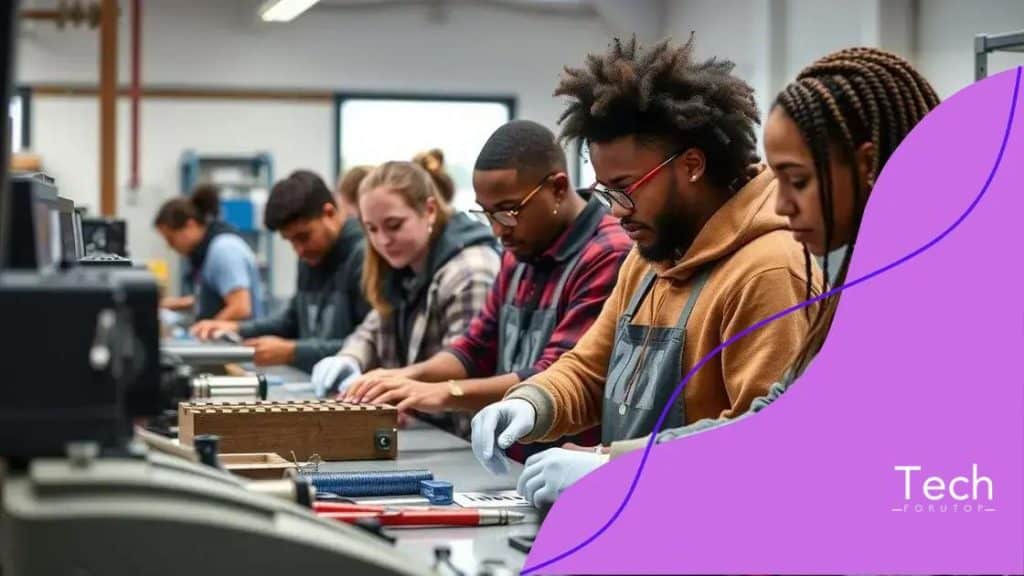Advanced manufacturing education grants for your future

Advanced manufacturing education grants provide financial support to students in manufacturing programs, helping them pursue their education without the burden of debt and enabling successful careers in the industry.
Advanced manufacturing education grants provide essential support for students aiming to enter this rapidly evolving field. Have you considered how these opportunities could shape your career path? Let’s dive in!
Understanding advanced manufacturing education
Understanding advanced manufacturing education is vital for those looking to enter this innovative field. It offers students the opportunity to learn about cutting-edge technologies and processes that drive modern manufacturing.
In essence, advanced manufacturing education involves a curriculum that includes practical and theoretical training. It prepares students for high-demand careers where they can harness skills in robotics, additive manufacturing, and data analytics.
The importance of specialized training
Specialized training in advanced manufacturing is crucial due to the rapid pace of technological change. As industries evolve, they need a workforce equipped with the latest skills. Receiving a strong education can lead to better job prospects and higher earning potential.
- Hands-on experience with state-of-the-art tools.
- Understanding of complex manufacturing systems.
- Knowledge of sustainable practices in manufacturing.
- Collaboration with industry professionals through internships.
Furthermore, students who engage in this education often find themselves at the forefront of innovation. They learn to solve real-world problems and improve production processes. Emphasizing critical thinking and problem-solving skills is a key aspect of their training.
Many programs also emphasize teamwork, reflecting industry environments where collaboration is essential. This prepares students not just with technical skills, but also with soft skills that are equally important in the workplace.
Benefits of advanced manufacturing education
- Access to modern technologies.
- Partnerships with local industries.
- Networking opportunities with professionals.
- Customized learning paths based on career goals.
In summary, advanced manufacturing education lays the groundwork for a successful career in a sector that is critical for the economy. Students who pursue this education are well-prepared for the challenges ahead, making them valuable assets to employers.
Types of education grants available
When exploring types of education grants, it’s essential to understand the various options available for aspiring students in advanced manufacturing. These grants provide financial support and can significantly reduce the burden of educational costs.
Education grants can be categorized into several types based on their funding sources and eligibility criteria. Some grants are awarded by government agencies, while others come from private organizations or educational institutions. Each type offers unique benefits tailored to different student needs.
Federal government grants
Federal grants are typically funded by the U.S. government. They are awarded based on financial need and can cover tuition, fees, and sometimes living expenses. The most recognized federal grant is the Pell Grant, which aids low-income undergraduate students. Another popular option is the Federal Supplemental Educational Opportunity Grant (FSEOG), which targets students with exceptional financial need.
- Pell Grants for low-income students.
- FSEOG for students with extreme financial need.
- TEACH Grants for aspiring teachers in high-need fields.
- Work-study programs that combine study and job experience.
Next, state government grants are another crucial source of funding. Each state offers programs tailored to their residents, helping students offset tuition at in-state colleges. These grants often require proof of residency and can be need-based or merit-based.
Private and institutional grants
Private organizations and foundations often provide education grants aimed at specific groups. Scholarships can target underrepresented minorities, women, or students pursuing particular fields of study. Additionally, many colleges and universities have their own grant programs that help students afford tuition.
- Corporate scholarships from companies looking to invest in the future workforce.
- Community foundations that support local students.
- Grants for adult learners returning to education.
- Specialized grants for fields like technology and engineering.
In summary, understanding the diverse types of education grants available helps students make informed decisions about their educational financing. By researching and applying for these grants, students can significantly alleviate the financial stress of pursuing their advanced manufacturing education.
Eligibility requirements for applicants

Eligibility requirements for applicants seeking advanced manufacturing education grants can vary significantly. Understanding these requirements is crucial for students who wish to secure funding for their education.
Typically, eligibility may depend on several factors, including financial need, academic performance, and residency status. Many grants are designed to assist students who demonstrate a genuine need for financial support.
Basic eligibility criteria
Most education grants will require applicants to meet basic criteria. These often include being enrolled or planning to enroll in an accredited program, maintaining a minimum GPA, and submitting the appropriate financial documentation.
- Enrollment status as a full-time or part-time student.
- Completion of the Free Application for Federal Student Aid (FAFSA).
- Demonstrated financial need based on family income.
- U.S. citizenship or eligible noncitizen status.
Additionally, some grants may have specific requirements based on the intended field of study. For example, students in engineering or technology programs might find targeted grants aimed specifically at their areas of expertise. These grants often seek to encourage enrollment in high-demand fields.
Additional considerations
Other factors can influence eligibility, such as demographic characteristics. Many grants aim to support underrepresented groups in manufacturing and STEM fields. This includes minorities, women, and veterans who have an interest in pursuing advanced manufacturing careers.
- Scholarships for women in engineering or technology.
- Grants for veterans re-entering the workforce.
- Programs supporting first-generation college students.
- Local initiatives that offer grants to residents.
It’s also important for applicants to pay attention to deadlines and application processes. Missing a deadline can mean losing the chance to secure funding. Staying organized and informed can make a significant difference in the application experience.
How to apply for manufacturing education grants
Applying for manufacturing education grants can seem daunting, but understanding the process makes it manageable. The first step is to identify the grants for which you qualify. This involves researching federal, state, and private options available to you.
Once you’ve found potential grants, it’s crucial to gather the necessary documentation. Most applications require proof of enrollment and financial need, as well as personal identification details. You may want to keep documents updated and organized for efficiency.
Steps to apply
The grant application process generally follows several standard steps. Begin by completing the Free Application for Federal Student Aid (FAFSA). This form determines your financial need and eligibility for federal aid, but it can also open doors to state and institutional grants.
- Complete the FAFSA online for accurate financial information.
- Research specific requirements for each grant you plan to apply for.
- Prepare supporting documents such as transcripts and letters of recommendation.
- Submit your applications before deadlines.
After submitting the FAFSA, monitor your email for any notifications regarding your application status. Some grants may require additional documentation or follow-up interviews. Being proactive can keep the process on track and help clarify any questions that arise.
Personalizing your applications
Customize each application to highlight your qualifications and reasons for pursuing funding. A personal statement detailing your goals and why you chose manufacturing can make a significant difference. It helps grant reviewers understand your motivations and commitment.
- Write a compelling personal statement.
- Explain your career goals in the manufacturing sector.
- Detail any previous relevant experience.
- Showcase your passion for the field and your long-term vision.
After you have applied, be sure to follow up with the institutions if necessary. This can be done through emails or phone calls. Staying engaged demonstrates your enthusiasm and can sometimes positively influence outcomes.
Success stories from grant recipients
Success stories from grant recipients illustrate the real impact that education grants can have on students’ lives. These narratives often inspire others to pursue similar paths and highlight the opportunities available in advanced manufacturing.
Many students who have received grants share how financial support allowed them to focus on their studies without the burden of debt. For instance, graduates often speak about how they had the chance to participate in valuable internships or projects that enhanced their learning experience.
Real-life examples
One inspirational story comes from a student named Maria, who received a manufacturing education grant. With this funding, she was able to enroll in a prestigious engineering program. Maria utilized the skills she acquired to land an internship at a leading manufacturing firm, where she worked on innovative robotics projects.
- Grants helped students pursue cutting-edge technology fields.
- Many graduates credit scholarships for their successful career starts.
- Support from education grants enables students to engage in research.
- Financial assistance often opens doors to professional networks.
Another notable story is that of John, who faced significant challenges in financing his education. After receiving a grant, he was able to complete his degree in industrial technology. Today, John is a project manager at a manufacturing company, leading teams to develop sustainable manufacturing processes.
The ripple effect of success
These stories demonstrate that when students receive assistance through grants, they can pay it forward. Many grant recipients not only achieve their personal goals but also contribute to their communities by mentoring others and promoting careers in manufacturing.
- Grant recipients often mentor younger students.
- Many give back to the community through workshops.
- Success stories inspire new generations to apply for grants.
- Recipients tend to advocate for education funding.
Highlighting success stories from grant recipients emphasizes the transformative power of education grants in advanced manufacturing. These stories reinforce the notion that financial support can lead to fulfilling careers and lasting contributions to society.
FAQ – Frequently Asked Questions about Advanced Manufacturing Education Grants
What types of education grants are available for advanced manufacturing?
There are federal, state, and private grants, each designed to support students in various manufacturing fields.
How can I determine my eligibility for these grants?
Eligibility often depends on financial need, enrollment status, and specific grant requirements, so it’s important to review each one carefully.
What is the application process for manufacturing education grants?
The application process typically involves completing the FAFSA and submitting specific documents for each grant you apply for.
Can success stories from past grant recipients help me?
Yes, learning from past recipients can provide motivation and insight into how grants have impacted their careers and how to navigate the application process effectively.





